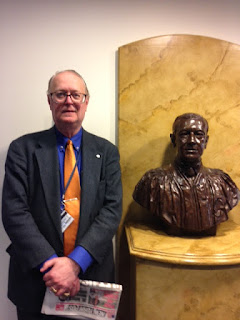Jim Patterson, left, with Vice President Mike Pence, Washington, D.C.
Ukraine, Iran and Trump
James Patterson
At a recent Washington meeting, Vice President Mike Pence and
I talked about several current issues, including the Trump administration’s
economic sanctions against Iran, Democrat California Rep. Adam Schiff’s secret
impeachment hearings, Ukraine, and the administration’s enforcement of laws
against international financial crimes.
Iran recently celebrated the 40th anniversary of
the seizure of the U.S. embassy in Tehran. Iranians blame the U.S. for
supporting the Shah of Iran until he was overthrown by revolutionaries. The Shah
died in exile in Egypt in 1980.
Former President Barack Obama endorsed the Joint
Comprehensive Plan of Action (JCPOA) with Iran to control nuclear production.
This “Iran deal” was never authorized by Congress and Iran was never in
technical compliance with Obama’s deal. Republican presidential candidate Donald
Trump said the JCPOA was a “disaster” and pledged to withdraw from it once he
was elected. President Trump fulfilled his promise.
Since President Trump withdrew from the JCPOA, Iran has
advanced meddlesome military adventurism including seizing oil tankers in international
waters, using drones to hit Saudi Arabian petroleum refineries, and actively destabilizing
the government of Yemen. Iran’s extreme and hostile actions appear designed to draw
the Trump administration into a conflict.
President Trump has successfully practiced steady diplomacy
with increasingly hard economic sanctions aimed at discouraging Iran from
military conflict. How long this can last is anyone’s guess. In recent days,
Iran has expressed a desire to improve relations with Saudi Arabia. This represents
progress. Whether this is real progress, is another matter.
Vice President Pence told me that he feels the sanctions are
the right economic tools to use against Iran and he estimates their economy has
shrunk by as much as 10 percent due to sanctions. Various news sources,
including CNBC, agree the Iranian economy is suffering due to sanctions.
President Donald Trump is not worried he will be impeached,
the Vice President said. Neither is the Republican controlled U.S. Senate or
Wall Street. The Dow Jones Industrial Average is trading at records highs.
Readers know I served at the Republican National Committee
during the House impeachment of Bill Clinton. The House impeached Clinton for sodomizing
Monica Lewinsky and lying about it under oath. Clinton was disbarred. The U.S.
Senate, under Democratic control, acquitted Clinton with an important vote
against impeachment by then-Senator Joe Biden.
Rumor is that President Trump may watch and tweet (Tweet
Watch) the televised House Impeachment Hearings. Trump considers impeachment a
joke and he is readying to get laughs at the expense of the comical Congressman
Adam Schiff and, very likely, millions of votes. Schiff is no match for Donald
Trump. I believe the identity of the government whistleblower should be
disclosed to the public. President Trump and the American people need to see
and hear the whistleblower.
In 1991, Ukraine gained independence when the Soviet Union
collapsed. It has struggled and openly sought political and economic alliances with
Europe. This angered Russia’s Vladimir Putin and he invaded the Ukraine and
annexed Crimea. See http://www.breakingpointfilm.com/
for information on Ukraine’s fight for democracy and statements former
Ukrainian Ambassador Bill Miller and I made about the documentary.
Ukraine asked the Obama administration for military aid to
fight the Russian invasion. Cowardly Obama and cowardly Secretary of State John
Kerry shamefully turned their backs on Ukraine. President Trump provided the
vital U.S. government assistance, including financial aid, that Ukraine needed.
After European intervention, Ukraine began to stabilize.
Then came former Vice President Joe Biden who allegedly intervened to aid a
corporation on which his son Hunter was a board member. In the final years of
the Obama administration, Washington had no greater influence peddler than Joe
Biden. From the looks of things, Biden was also engaged in international
influence peddling in China, and Romania, as well as Ukraine.
Joe Biden is a candidate for the Democratic presidential
nomination. Due to his age, questions about his mental status, and a strong
field of younger and brighter candidates, I do not believe Biden will be on the
November 2020 ballot.
Financial crimes are among the largest growing criminal
activity and U.S. citizens are targeted by international criminals. Insist that
Washington take more steps to combat financial crimes like money laundering,
and tax evasion.
Vice President Pence was the campaign trail for Republicans prior
to the Nov. 5 elections in Mississippi, Kentucky, Virginia and elsewhere. He is
ready for the Main Event: Trump/Pence 2020! If you support President Trump, write
your friends in other states and tell them of your support and ask them to vote
Trump/Pence 2020!
-30-
Writer/Speaker Jim Patterson is a member of Alabama’s
State Society in Washington, D,C. JEPDiplomat@gmail.comJim Patterson is a member of the Society for Historians of American Foreign Relations and Friend of the Israeli Defense Forces.
I mailed President Trump a copy of my recent New York Post, Letter to the Editor.













